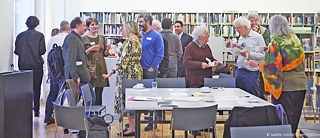Recalculating the Route
Please turn around, if possible

Hardly any other topic is presently dividing political debates in Europe like the Brexit. While its outcome is still unclear, with its Europe Actually series of events the Goethe-Institut London emphasises the importance of the European sense of community. Brexit was illuminated from new angles in a public debate called Recalculating the Route. The chief results of the discussion will be presented in Weimar at the Goethe-Institut’s international Kultursymposium from 19 to 21 June.
Taking a step back from Brexit to place its causes and effects in a larger context: That’s what an event led by Emma McFarland at the Goethe-Institut London was about. This created surprising connections with psychology, economics, ecology and the social forces that shape our society. International experts gave keynote speeches that were informally discussed by small groups of participants.
The psychology of an exit
The psychotherapist Susie Orbach, who gained world renown with socially critical writings such as Fat is a Feminist Issue (1978) and Bodies (2009), showed how much the Brexit has already influenced the psyche of the nation. She compared the impositions of Brexit with divorce. This teaches us – and the British – things we didn’t know about the country, that we must take note of its divisions and the rise of racism being brought to the surface. It’s also about enduring despair, aggression and betrayal, and about politicians who deny voters the right to change their minds although they do so themselves all the time. “Politics has been unmasked like never before,” summed up Orbach. “Our political leaders are not committed to the good of the country, but to internal party interests.” In addition to feelings of anger and confusion, this gives rise to a need to be able to close the process, to grieve and heal. In his talk, Sudhanshu Swaroop, a lawyer specialising in international law, said that Brexit ties up so much of the country’s political and social energies that other big issues fall short. For example, climate change, he noted, is “the prime example of a problem that requires immediate action.” We have a window of about twelve years. “Maybe there is a Plan B for our Prime Minister,” he said. “But there is no planet B.”
Kidnapping the Brexit campaign
In the working groups of Ghislaine Boddington, who runs an interactive creative design collective, they focused on identity issues. How do we define our own identity in times of the Brexit? And how has the nation’s relationship to “others” changed? “We are also talking about it for our grandchildren,” Boddington explained. It was no coincidence that almost all of the participants in Europe Actually were non-British residents from all over the world, from the Netherlands to Israel. They are all affected in a special way by the Brexit and its uncertainties. Jacob Davey, a research manager at the Institute for Strategic Dialogue, touched on how both right wing and leftist groups are exploiting this political issue for their own ends. Davey spoke of “campaign hijacking” and how it brought radical ideas into the mainstream and made them socially acceptable.